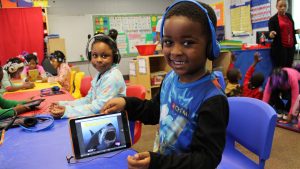By Tabby Brown

A University of Alabama College of Human Environmental Sciences study of 393 pre-kindergarten children in the Tuscaloosa City School System indicate that more than 80 percent are ready for kindergarten.
Initial results show the system’s pre-K teachers helped the children develop the needed skills for starting kindergarten, said Dr. Maria Hernandez-Reif, UA professor of human development and family studies and the primary investigator.
The study examined “school readiness” as defined by the Office of School Readiness in the state’s Department of Early Childhood Education.
Areas that indicate readiness include: an eagerness to learn; skills to function in a social setting; age appropriate skills to communicate and participate in problem solving or learning; age appropriate emotional skills; and good physical development and optimal health.
The study was funded by the Malone Family Foundation, Project LAUNCH and the UA College of Human Environmental Sciences and assessed children at the beginning and end of the 2017-2018 school year.
Tools used to evaluate the TCS pre-K program included a scale, developed by the Alabama Partnership for Children and modified by Hernandez-Reif, that identifies indicators that help children become ready for school. Teachers completed scales on children in their classrooms at the beginning of the year to provide a baseline and again at the end of the school year to measure improvement. Over 90 percent of children in TCS pre-K programs were assessed.
“Child Development Resources does a lot of work with providers and families to promote optimal child development,” said Dr. April Kendrick, director of Child Development Resources at UA and collaborator on the project. “We are so pleased to see that young children in our community are performing well and are socially and emotionally prepared for kindergarten.”
The analysis also found that family involvement greatly influenced children’s skill development over the school year. Children whose family were “rarely” or only “sometimes” involved in their pre-K child’s education made smaller gains compared to those whose family were “almost always” involved.
Results also indicated that although the majority of the children reliably made it to school on time, a little over 10 percent of the children were sometimes or almost always absent or tardy during the first two months of school. Children whose parents were “rarely” involved were also more likely to be tardy or absent from school.
“This highlights the importance of helping parents understand that they have a great opportunity to help prepare their child for school by enrolling them in pre-K and that getting them to school on time is important,” Hernandez-Reif said. Examining barriers that may be preventing parents from being involved in their young children’s education is an area that is prime for program development, she said.
Hernandez-Reif said she is eager to expand the research, looking more closely at the impact of the relationships among family, teacher and child.
“This research opens doors to further explore how we can support children and families.”
